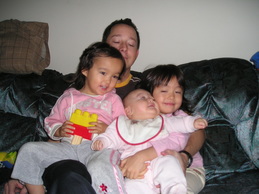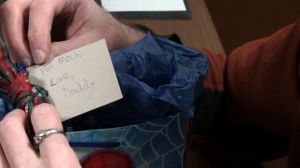|
International child abductions by Japanese spouses has been a serious issue for a long time. Hear from a child perspective. ...But the issue of child abduction in Japan has now morphed into a full-blown diplomatic stand-off for Tokyo, not just with France, but Australia and the United States. French authorities estimate more than 100 children have been caught up in similar circumstances to the 68 Australian children. The United States has 475 children in such situations.
During the Olympic Games, French father Vincent Fichot went on an almost three-week hunger strike outside Tokyo’s Olympic Stadium. He had not seen his kids in three years after his wife abruptly disappeared with them. “The problem with Japan is it is a zero-sum game, there can only be a winner and a loser,” said Australian mother-of-two Catherine Henderson who has spent more than two years attempting to see her kids in Tokyo after her Japanese husband packed up and left with them in April 2019. “There is nothing about the best interests of the child.” (Jeffery) Morehouse has won two custody cases in the US against his Japanese wife but has not seen his son Mochi in more than a decade. “They erase the other parent,” he said. “When a child is kidnapped their whole life is built on a foundation of lies.” Japan is known as the "black hole of child abduction”. But why does it keep happening? Hear the thoughts and experiences of several activists and experts. ...studies show that depriving children of access to one of their parents can be traumatic and psychologically damaging, says Noriko Odagiri, a professor of clinical psychology at Tokyo International University.
“Children feel like their father abandoned them, that he doesn’t love them anymore,” she said. Morehouse is frustrated that President Trump has, on Abe’s insistence, advocated strongly for Japanese citizens who were abducted by North Korea in the 1970s and 1980s, meeting their families and raising the issue with North Korean leader Kim Jong Un, but has not done so for hundreds of stranded American children. The president “ran on a statement and policy of ‘America First,’ ” he said. “He ought to put American kidnapped children first, and bring them home from Japan and other countries.”  Congress United for Action: Strive to Return America’s Stolen Children U.S. Capitol, S-115 Formal Remarks
Members of Congress (Invited) International Parental Child Abduction: A Unifying Issue for Congress Use the Tools Accountability and Returns Under the Goldman Act International Parental Kidnapping Crime Act of 1993 Improving Victim Response and Charging Rates under federal IPKA statutes Two Teen Survivors Share Their Experiences Count Children, Not Cases Affecting Data-Driven Solutions in the Departments of State and Justice What American Families Need from Congress Congressional Solutions through Casework, Legislation and Oversight Speakers: Dr. Noelle Hunter, mother of an American child abducted to Mali Co-founder and President of iStand Parent Network and Coalition Partner view written remarks Ravi Parmar, father of an American child abducted to India Co-founder of Bring Our Kids Home and Coalition Partner Jerry Pfeifer, survivor of international parental child abduction Leo Zagaris, survivor of international parental child abduction Jeffery Morehouse, father of an American child abducted to Japan Co-founder and Executive Director of Bring Abducted Children Home and Coalition Partner view written remarks Formal Remarks by Members of Congress: Senate Majority Leader Mitch McConnell* U.S. Senator Thom Tillis (by video provided to The Coalition) U.S. Senator Diane Feinstein (in a statement read by her staff)* U.S. Representative Chris Smith* *not included in the briefing video Japanese leaders and diplomats regularly lambast North Korea for the abduction of their citizens by state spies – one of countless human rights abuses committed by Pyongyang.
What is less known is that hundreds of American children have been abducted to Japan in defiance of international conventions, while at home, hundreds of thousands of Japanese children suffer from facto parental kidnappings. The Foreign Correspondents Club of Japan hosted a panel in Tokyo to discuss domestic and international parental child abduction. Topics included harm to the children, shortcomings in Japanese family law and how Japan's Continuity Principle is keeping children kidnapped. Panelists included:
WASHINGTON—Parents Jeffery Morehouse, Juan Garaicoa, and Michelle Littleton sat before a House Foreign Affairs subcommittee on Dec. 10 to testify about the same terrible fate of their children—international abduction by a spouse.
“While most children were returning to school, my children were boarding a plane and being kidnapped to war-torn Lebanon,” Littleton, a mother of three, said. “She had kidnapped our son to Japan,” said Morehouse, the founder and executive director of the non-profit Bring Abducted Children Home. “I don’t even know where he is being held.” “Time is of the essence and now is the time to bring our children home,” pleaded Garaicoa, whose two children remain in Ecuador. While the countries, children, and spouses are different, they share the same frustration of fighting to be reunited with their children in foreign lands. Morehouse won custody of his children in U.S. courts—and twice in Japan—but his teenage son, Mochi, who was taken by his wife at age 6, remains in Japan with his mother because there is no enforcement mechanism under Japanese law. “In the end, the court refused to reunite Mochi and me,” said Morehouse.”It does not matter how a child ends up with the abductor in Japan, they will not uphold laws and treaties to return children to their rightful home.” Jeffery Morehouse dropped his 6-year-old son off with his mother for a weeklong visit in 2010 — and she managed to abscond with him to Japan.
On Monday, Mr. Morehouse, executive director of Bring Abducted Children Home, called on Congress to step up American efforts to bring his son and other children back from overseas, saying the government’s actions are inconsistent and insufficient. “President Trump ran on putting America first,” Mr. Morehouse said in his testimony to the House Foreign Affairs subcommittee on global human rights. “Well, America first means putting American children first and bringing them home.” Jeffery Morehouse Testifies to Congress 'Japan's Systemic Failure to Return Kidnapped Children'12/10/2018
"Prime Minister Abe for the past two years has spread it all over the press how President Trump and the U.S. are going to help Japan resolve the 1977-1983 kidnappings of 17 of their citizens in to North Korea. I feel for those parents. I understand their pain. It is my pain. It is our pain. We should help with that. It's the right thing to do. President Trump ran on putting America first. Well, America first means putting American children first and bringing them home. Prime Minister Abe, what about returning the 400+ American children kidnapped to Japan since 1994? What about returning Mochi? Rep. Smith calls for Trump administration crackdown on international parental child abduction12/10/2018
WASHINGTON – House Foreign Affairs subcommittee Chairman Chris Smith called on the Trump administration to take concerted action to stop international parental child abduction.
“The Trump administration can and must use current law, especially the tools embedded in the Goldman Act, to more aggressively bring American children home to their families,” Smith (R-N.J.) said at a hearing on Monday that featured testimony from parents whose children were abducted abroad. Smith said “child abduction is child abuse.” Smith said more than 450 American children are abducted each year. He said 11,000 children were abducted internationally between 2008 and 2017. Panelists relayed their experiences to the committee and implored action. “The last time I saw my son was on Father’s Day of 2010,” said Jeffery Morehouse, executive director of Bring Abducted Children Home. That day, Morehouse said, he dropped off his then-6-year-old-son, Mochi Atomu Imoto Morehouse, with his ex-wife for a week-long visit. Three weeks later, Morehouse said, the police informed him that his wife and son had been reported missing. “I knew immediately what happened,” Morehouse recalled. “She succeeded in what she had threatened to do. She kidnapped our son to Japan.” Morehouse said he pursued the matter in Japanese courts and won. U.S. Congressman Chris Smith provides an impassioned plea for the return of "Mochi" Atomu Imoto Morehouse and all children kidnapped to Japan by a parent. The video was released at a May 29, 2017 press conference in Tokyo by Jeffery Morehouse and attorney Akira Ueno at the Tokyo Courthouse. (full transcript in Japanese and English follows) ジェフリーモアハウスは、2010年以来、彼の誘拐された息子、モチ君と再会すべく、粘り強く、思慮深く、努力し続けています。
国際的な人権を監督する公式な議会小委員会の議長として、私は、ジェフリー氏を議会に招待しました。彼に自らの話を議会で証言してもらうためです。彼の証言を聞いた私は、深く感動しました。彼とモチ君が、この悲痛な、そして非合法な引き離しの結果として味わっている苦痛、苦しみ--その苦痛を知るにつけ、彼の息子に対する愛情がどれだけ並外れたものか分かります。 2015年にジェフリー氏が米国議会に報告したとおり、彼は2007年以来アメリカ合衆国においてモチ君の単独監護権を有しています。この事実はまた、2014年に日本の法廷でもまた合法なものとして認められています。にもかかわらず、彼の息子が日本政府によって彼のもとに戻されなかったことについて、私は衝撃を受けました。 彼がどれほどの苦痛を味わっているか、それは私の想像を超えるものでしょう。彼と会い、話を聞く度、私はそう感じます。彼は、モチ君が無事に帰ってくるために、精力的に努力し続けている愛情深い父です。 1994年以来、アメリカ合衆国から日本への親による誘拐事件は数百件あります。その中でもジェフリー氏のケースは、母親による重大な違法行為がある点で目を引きます。日本にとどまることが「子供の最善の福祉」であると主張することは間違いです。もちろん、それは誘拐された後で日本に行った場合でも、日本で誘拐があった場合でもです。親による子の連れ去りは、児童虐待です。そしてそれは、その状態が続く限り、日々進行し続けています。 日本は、人口の多い大国です。そして我が国の友人であり、重要な同盟国です。しかし、いかなる民主国家も、いかに立派な政府であっても、こうした犯罪行為を許し続けてはなりません。 2011年に、私は、日本に連れ去られた子供との再会をただただ願うたくさんのアメリカ人の親御さん方のために来日しました。私がお会いした日本側の官僚の方や政府高官の方は、こうした国際的な子の連れ去り引き離しが、子供と引き離された親の両方にとってどれだけ深い傷を残すかということについて、大いに賛同してくださいました。 日本が国際的な子の誘拐に関するハーグ条約にすでに署名していることは周知のとおりです。これは、こうした子供の誘拐事例をハーグ条約の精神に沿って適切に解決するという政府の意思の顕れです。 にもかかわらず、すでに数年前に裁判所での判断が出ているはずのモアハウス氏のケースは、いまだ解決できていません。父子の再会はできないままであり、日本における人権問題として取り上げられ続けています。 私は日本政府の友人たちに求めます。どうか、いまだ未解決の国際的な子供の誘拐問題について、決定的な措置を取ってください。どうか、モチ君を、愛情に満ちた父親の下に帰してあげてください。 Jeffery Morehouse has been tenaciously and thoughtfully trying to reunite with his kidnapped son, Mochi, since 2010. As the chairman of the official congressional subcommittee that oversees international human rights, I invited Jeffery to testify before congress to tell his story. I was deeply moved. The love he has for his son is extraordinary—as is the suffering and pain he and Mochi endure as a result of this heartbreaking and illegal separation. As Jeffery reported to the US Congress in 2015, he has had sole custody in the United States since 2007. This fact was also recognized as legal by the courts in Japan in 2014. Thus, it is shocking that his son has not been returned to him by the Japanese government. I can't imagine the pain of this kind of separation, and I hear it in his words every time I see him, and that is often. He is a loving father tirelessly trying and working for return of his son. There have been hundreds of parental abductions from the U.S. to Japan since 1994. Jeffery's case underscores a serious injustice. It is false to claim that it is “in the best interest of the child” to remain in Japan—or anywhere after being kidnapped and taken there. Child abduction is a daily, ongoing form of child abuse. Japan is a great country with many great people. It is a friend and important ally of the United States. But, no democratic, honorable government should allow this type of criminal act to continue. In 2011, I traveled to Japan on behalf of many American parents who simply wanted to be reunited with their children. Japanese elected officials and government officials with whom I met, agree that the forced separation is deeply damaging—both for the child and the left behind parent. Japan as we all know has since signed the Hague Convention on the Civil Aspects of International Child Abduction—signifying the government’s intention to properly resolving these child abduction cases. But the Morehouse case, already adjudicated in the courts years ago, continues to raise troubling questions about Japan’s human rights’ record and its commitment to reuniting families. And so I call on my friends in the Japanese government to please take decisive action in this and other pending international child abduction cases. Please return Mochi to his loving father. "The Canadian father is far from alone in trying to navigate a seemingly impenetrable and hostile Japanese system sometimes described as a black hole for children."
Tim Terstege, Kris Morness, and Bruce Gherbetti are among the parents who continue to try to reunite with their kidnapped children. Dear Gunnar and Kianna:
I love you very much and I miss you very much. This week I participate in more events in Washington DC in order to gain access to you. We have been apart for far too long. I wish I knew where you lived. I just don’t know. If I knew your number I would call you right now.  Eileen Toland Eileen Toland By Paul Toland “Grandmas hold our tiny hands for just a little while, but our hearts forever.” ~Author Unknown A few days ago, I watched the film “From the Shadows” about the human rights tragedy of International Parental Child Abduction to Japan. The scene that struck me hardest was watching Kaya Wong’s paternal grandmother attempt to visit Kaya on her way home from school and bring her some presents including a stuffed Panda bear. Kaya’s mother Akemi died from cancer in 2005 and soon after she was abducted by her maternal grandparents, Satoru and Sumiki Yokoyama. Kaya’s father, Paul Wong, has had no access to Kaya since the abduction. Likewise, Kaya’s paternal grandparents have also had no access to her. Dear Mochi,
I tried to find you during New Year’s in Japan. I have never given up. I just wanted to give you a present, some Legos. They were always your favorite. Maybe I’d get to speak to you or give you a hug. I walked seventeen miles through the snow and rain, over two days, trying to locate your grandparent’s house. I was hoping you might visit there for the holidays.  By Jeffery Morehouse On my recent trip to Japan, I met with several of the leaders, activists and groups in movement there to end parental child abduction and create joint custody laws. Their domestic problem is enormous in its volume. I met parents that had some briefly monthly visitation and as extreme as a father who has not seen his children for seven years. He would later assist me as I tried to deliver a present for my son on New Year’s Day. One of the interesting facets was to see the utilization of Japanese animation characters in doing the public outreach at the event in Gifu, Japan. Frankly at first, I thought it was strange and undercut the seriousness of this human and family rights issue. Then I looked at it through local eyes and saw its brilliance. These characters create an easy entry point to the hearts and minds of children and young women. Dear Mochi,
We miss you so much and think about you everyday and pray that you are being well taken care of but, we along with your Daddy, want you to come back to your home. There are so many fun things waiting for you here. Original post: http://4rionandlaurenandjulia.wordpress.com/2012/05/01/rions-9th-birthday/
Rion and her sisters Lauren and Julia were abducted from Vancouver, Canada to Japan September 2009. Without a Dry Eye
When my kids left for Japan on summer travel That’s the moment my entire life began to unravel. She told me they were going to the island nation but she didn’t tell me it was for a everlasting vacation.  Dear Mochi, In just a few days it will be Christmas, and soon after that the beginning of a new year. Grandma and myself think of you always. With the advent of the holiday season we wanted you to know how much you are in our daily thoughts and hearts. Time seems to have passed by so quickly since we last held you, talked with you and laughed with you. Your smile, politeness, tender ways and infectious laugh continue to resonate within our souls daily. In just the few years we were able to be present in your daily life, you brought a life long carpet of happiness to ours. Went to Iwaki again Friday, December 2nd.
Upon arriving at the Suzuki family home I discovered it to be very quiet. I heard a television on in a side room and upon knocking and investigation it turned out that my father-in-law was there sleeping. It seems that my middle daughter Lauren had returned from school and was upstairs either playing very quietly or (more likely) having a nap. Suzuki Akiyoshi (her grandfather) upon waking him had no idea that she was even there. What is wrong with these people that a six year old is left to fend for herself in the company of an ill old man who is unaware of her presence. Children walk the streets alone here in Japan. They are raised by schools and ostensibly must raise themselves much of the time. My father-in-law had no idea where his wife was, no clue where my eldest daughter Rion was, no information at all. Unbelievable and sad.  This was sent to me by my daughter Rion (via her mother) when Rion was 5 years old. Every summer from 2005-2009, Taiko and the girls would go to Japan for 5 weeks to visit their Japanese family while I remained home working. These summer visits were hard for me because I missed my daughters so much when they were gone, but I felt it was important that they know their Japanese heritage and visit with their Japanese family. I would speak to them every day while they were away. Sometimes I would receive emails like this one: |
Categories
All
Archives
May 2024
|











 RSS Feed
RSS Feed